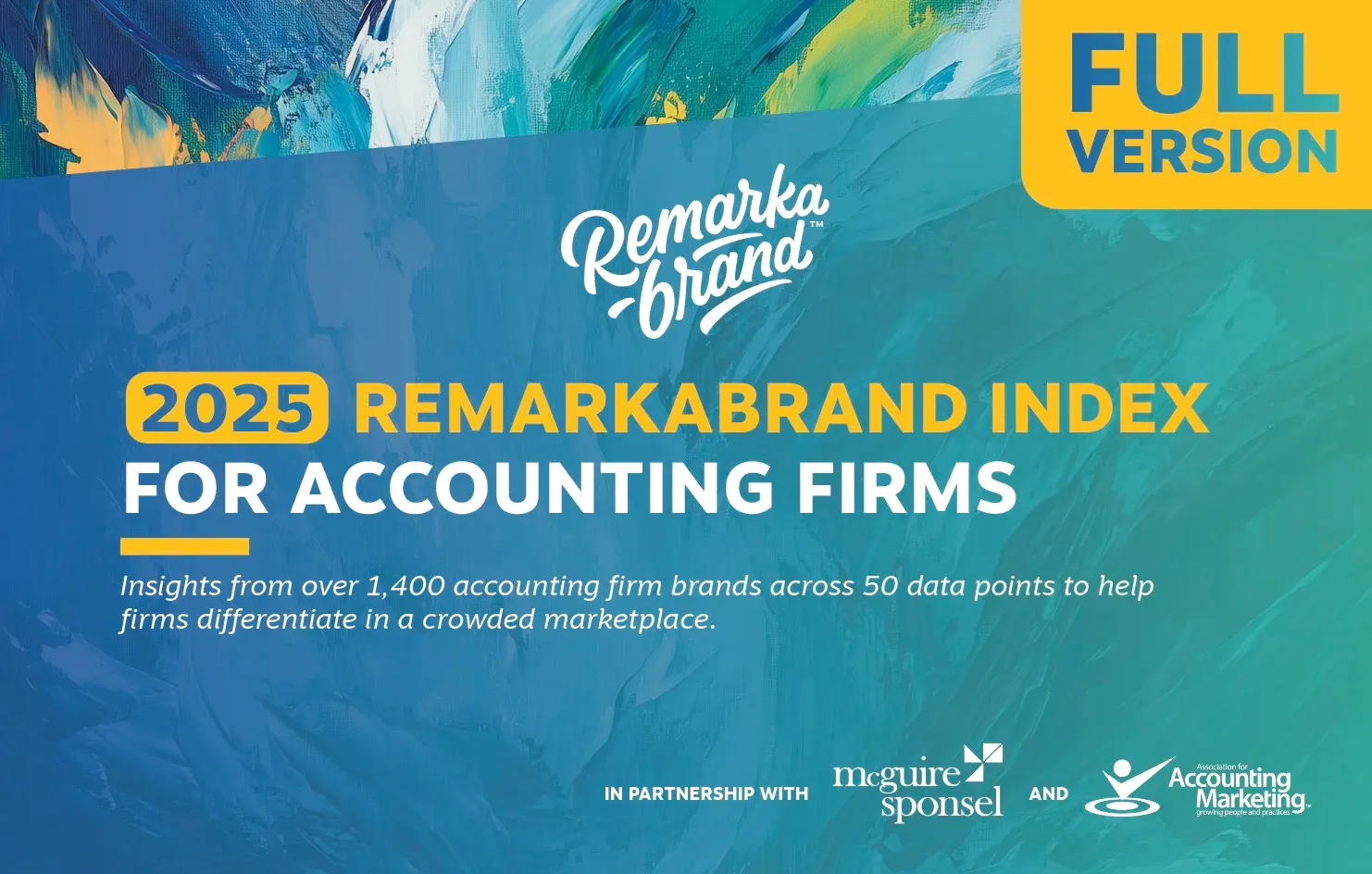Another week, another massive private equity deal in the accounting industry.
This time it’s Sorren, a brand new firm created from merging 13 or 14 companies. They chose an entirely new name and logo rather than building on existing firm equity. As someone who analyzes professional services branding daily, I found their approach both interesting and instructive.
But here’s what really matters: if you’re a professional services marketer in accounting, these PE-backed consolidations are reshaping your competitive landscape whether your firm is involved or not. You need to understand the implications and be ready to guide strategic conversations.
Let me share what I’ve learned from watching dozens of these deals unfold … and how you can position yourself as an invaluable strategic advisor during industry turbulence.
The Scale vs. Service Dilemma Every Marketer Must Address
Private equity firms aren’t investing billions in accounting practices out of altruism. They’re betting that scale creates competitive advantages: better technology, deeper talent pools, expanded service capabilities, and operational efficiencies that smaller firms can’t match.
The marketing challenge? Proving this scale actually benefits clients rather than just investors.
When Baker Tilly received $1 billion from Hellman & Friedman, when Grant Thornton took on New Mountain Capital, when CohnReznick partnered with Apax Partners, each deal required convincing clients that bigger meant better for them. Not just better for the firm.
Your role as a professional services marketer is helping your firm navigate this perception challenge. Whether your firm is pursuing PE backing or competing against it, you need frameworks for addressing the scale vs. service question that partners might not consider.
Getting your post-merger messaging in order requires firm leaders accept this uncomfortable truth: clients often see PE involvement and immediately worry about two things (higher prices and lower service quality). Your messaging strategy needs to address these fears head-on, not ignore them.
Case Study: Sorren’s Self-Inflicted Sameness Problem
Let’s examine how Sorren approached their brand launch, because it illustrates common mistakes firms make during PE-backed mergers.
Their tagline reads: “Seeing beyond numbers to what matters – you.” The website elaborates: “We partner with you to handle today’s needs while preparing you for tomorrow’s opportunities.”
Sounds reasonable, right? Here’s the problem: we analyzed over 1,400 accounting firm taglines for our 2025 Accounting Firm Index, and Sorren’s messaging contains virtually every buzzword that already saturates the market. “Seeing beyond numbers” is quintessential accounting-speak that hundreds of firms already use.
This represents what I call “self-inflicted sameness”: choosing commodity positioning when differentiation matters most. When you’re launching a brand new firm created from multiple mergers, blending in with everyone else wastes the opportunity to stand out.
As a professional services marketer, you have access to competitive intelligence that partners making these decisions might miss. Tools like our Accounting Firm Index (available at remarkabrand.com/2025-remarkabrand-index-for-accounting-firms) give you data-driven insights about market saturation, messaging trends, and differentiation opportunities.
This positions you as the expert who prevents costly positioning mistakes. When your firm faces merger discussions or competitive pressure, you become the person with actionable market intelligence rather than just tactical execution skills.
Three Strategic Opportunities for Professional Services Marketers
The PE consolidation wave creates distinct opportunities depending on your firm’s position. Here’s how to frame strategic conversations with your partners:
1. If Your Firm Is Pursuing PE Investment
Your accounting marketing expertise becomes crucial for proving the “better together” story to both clients and potential investors.
PE firms want evidence that merged entities can deliver superior client value, not just operational efficiencies. You need concrete proof points: new technology implementations, expanded service capabilities, stronger talent from acquired firms.
But here’s what many firms miss: you can’t just claim these benefits exist. You must demonstrate them quickly and specifically. Introduce clients to new team members from merged firms. Show tangible technology improvements that benefit their experience. Document expanded capabilities they couldn’t access before.
Most importantly, address pricing concerns proactively. Many legacy clients probably underpay for services they’ve received for years. Price increases become inevitable, but rolling them out requires strategic timing and clear value justification.
Your role is developing accounting marketing messages that frame necessary changes as client benefits rather than firm necessities.
2. If Your Firm Competes Against PE-Backed Giants
The consolidation trend creates significant opportunities for well-positioned smaller firms, but only if you abandon generic “full-service” positioning.
When large firms merge and inevitably lose some clients due to service changes or cultural misalignment, where do those clients go? They seek firms that offer what the merged giants can’t: personal attention, specialized expertise, and genuine partnership.
But you can’t compete on scale. Generic positioning like “we handle all your accounting needs” plays directly into PE-backed firms’ strengths. They can legitimately claim broader capabilities and deeper resources.
Your competitive advantage lies in specialization. Choose specific industries or service areas where you can build genuine thought leadership. Geography matters less in our digital world. If you become the recognized expert serving, say, construction companies or healthcare practices, you can build a national practice around that expertise.
This requires strategic positioning decisions that many partners resist. They want to serve everyone rather than exclude potential clients. Your job is presenting market data that shows specialized positioning drives higher profitability and stronger client relationships.
3. If Your Firm Faces Industry Disruption
Whether consolidation affects your firm directly or indirectly, you need positioning that anticipates market changes rather than reacts to them.
The most successful firms during industry transitions are those that clearly articulate their unique value before competitors force the conversation. This means proactive brand development rather than reactive messaging.
Start by analyzing your client base. Which clients value your firm most? What specific outcomes do you deliver that others don’t? How do those capabilities translate into market positioning that differentiates you from both traditional competitors and PE-backed consolidators?
Document success stories that prove your approach works. Build thought leadership around your unique methodology or industry focus. Create content that establishes your partners as go-to experts in your chosen areas.
When industry turbulence hits (and it will continue), you want prospects seeking exactly what your firm does best.
Elevating Your Strategic Value
Here’s the career opportunity many peer professional services marketers miss: these industry changes position you as essential to strategic planning rather than just reactive marketing execution.
Partners making merger, acquisition, or competitive positioning decisions need market intelligence, client perception insights, and competitive analysis. They need someone who understands how branding and positioning decisions affect business development success.
That’s your expertise. But you have to claim it.
Come to strategic conversations prepared with data. Use resources like competitive analysis, client feedback, and market research to inform positioning discussions. When partners debate whether to pursue PE investment or how to compete against consolidated firms, you should be the person with knowledge needed to inform positioning discussions.
Position yourself as the expert on client perception management. When deals happen (whether your firm is involved or competing against them), clients have concerns that partners might not anticipate. Your role is helping address those concerns proactively rather than reactively.
The Consolidation Wave Continues
This isn’t a temporary trend. Private equity firms have invested billions in accounting practices over the past 18 months, from Aprio’s partnership with Charlesbank to the massive Baker Tilly-Moss Adams merger. More deals are coming.
Each deal reshapes competitive dynamics in local and national markets. Each creates opportunities for firms positioned to serve clients seeking alternatives to consolidated giants. Each requires strategic thinking about positioning, differentiation, and client communication.
Your success as a professional services marketer depends on anticipating these changes rather than reacting to them. Build expertise in competitive positioning. Develop frameworks for client communication during industry transitions. Create strategic value that partners recognize and rely on.
The firms that thrive during industry consolidation will be those with clear positioning, authentic differentiation, and strategic marketing leadership.
Which category will your firm choose? And how will you help them get there?
The wave is here. Time to decide whether you’re riding it or getting swept away by it.



